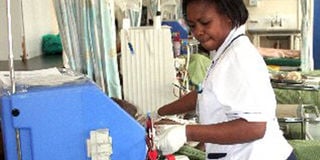New kidney support group promotes benefits of early transplants

A nurse attends to a patient at a renal unit. PHOTO | MICHAEL MUTE | NATION MEDIA GROUP
What you need to know:
- Patients are also saved from the hassle of applying for passports and visas that will enable them to travel for treatment, which adds on to their stress.
- The cost of accommodation for both the patient and their caregiver is also removed from the equation.
- The cost of getting a kidney transplant is also much lower than having to undergo dialysis for a few years and then having the surgery done later, said Dr Ahmed Sokwala, consultant physician and nephrologist at the hospital.
The Aga Khan University Hospital has formed a support group for kidney patients to promote local transplant surgeries.
The Kidney Transplant Support Group is made up of patients who have had transplants, those on the waiting list, and those who are yet to make the decision to have the operation. It also has donors and caregivers.
It is meant to bring people in various stages of the process to meet and share their experiences, with a view to having more transplant surgeries done in the country.
“We have the technology; and we have the capability of performing the transplants in the country,” said Dr Twahir Ahmed, head of nephrology at the hospital. “We want to discourage patients from going abroad for the operation.”
According to Dr Ahmed, a kidney transplant is recommended as soon as possible in order for the patient to avoid having to undergo dialysis for long periods. A patient who has the procedure done early after diagnosis can stay with the new kidney for 20 to 25 years after the operation.
However, “the longer a kidney patient has had dialysis, the shorter the lifespan of the new kidney he or she receives,” he said.
Having a kidney transplant in Kenya comes with a number of benefits, said Deborah Ita, Aga Khan Hospital transplant coordinator, including the benefit of lower cost and reduced distance for travelling.
SAVED HASSLE OF PASSPORT APPLICATIONS
Patients are also saved from the hassle of applying for passports and visas that will enable them to travel for treatment, which adds on to their stress. The cost of accommodation for both the patient and their caregiver is also removed from the equation.
The cost of getting a kidney transplant is also much lower than having to undergo dialysis for a few years and then having the surgery done later, said Dr Ahmed Sokwala, consultant physician and nephrologist at the hospital.
Patients who have undergone the procedure agree with this. Mr Pius Ngeti, Mr David Murai, and Mr Josiah Karuri are among the few who have had kidney transplants at the hospital.
Mr Murai, who was diagnosed with kidney failure in mid-July last year, said that he was advised to have surgery as soon as possible. He only underwent dialysis in the three months it took for him to get a donor and have all the tests done before the procedure could be performed.
“I did not want dialysis. It’s like a prison. I’ll urge any kidney patients to stop doing the dialysis and get a transplant instead,” said Mr Murai during the meeting.
On the issue of financing the operation, Mr Murai said: “Luckily for me, I had arranged my finances and I did not call on people to do a harambee for me. I did not want to bother them.”
The cost of the operation, which was performed at the Aga Khan University Hospital, was Sh1.8 million. The first month after the surgery set the Murai family back a further Sh150,000, which catered for the drugs that prevented the rejection of the new kidney and consultation costs.
However, as the months went by, the need to visit the hospital as well as the number of drugs administered reduced, as did the cost.



